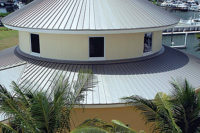
In today's sheet metal business, some metal fabricators manufacture all trim parts on site on portable handbrakes and then fabricate panels from crane-suspended portable roll formers. On the other hand, there are companies who fabricate an entire job in a remote sheet metal shop, ship it, unwrap and install. Either type of business can benefit from the following safety measures.
Increase Ease of Installation
To really understand how to set up an efficient yet safe metal shop, it's best to work backwards from the point of installation of the parts because the jobsite is where the most danger exists for employees and companies. The most dangerous place for anyone, at any time, is the jobsite. It's usually unfamiliar territory, with the hustle and bustle of the jobsite, people coming and going, and changing weather conditions. The faster you can get a good quality product produced and completed, the faster you can get off the jobsite.The most efficient way to do this is to use an automated folding machine. These machines produce parts that can be counted on to be consistent. This reduces the time on the roof and at the jobsite. Automated folders, for all their reduction in wear and tear on former handbrake operators, can make the actual installation more efficient-quicker and therefore safer. Think about it this way: You have four 10-foot pieces of coping; two are fabricated on an automatic folding machine, a pair of tongs is used to quickly open a hem, slide them into an overlap condition and then close the hem.
Say you have two other pieces produced on a manual handbrake. They're off a little, maybe only an eighth of an inch but nothing lines up, so your employee goes up and down a ladder, and digs through trim to try to find a piece that is closer. He's tired, so he pushes, tugs and forces it a little too much. You've got the perfect setup for a fall or a cut, not to mention increased wear and tear on your installers.
Whenever possible, use the principles of efficiency to reduce time on the jobsite and time interacting with a panel. This is why portable roll formers are actually beginning to make inroads with major manufacturers. Efficiency means profits, but it also means safety.

Preventive Maintenance and Training
Preventive maintenance is very important for two reasons. Safety maintenance of the machine should be a staple of any PM program, and a machine that is well maintained will be available for performance more often, thereby avoiding situations where corners may be cut. Every machine should be reviewed weekly to make sure that safety mechanisms such as emergency stops, limit switch-controlled covers and electrical eyes are aligned. This will ensure that the machine is not a hazard in and of itself.An integral part of a PM program is maintaining the machine so that it is available for production and you don't get behind. Injuries are for more likely when the pressure to get production up and running is such that someone cuts corners. It happens every day and could be avoided if machine downtime is eliminated.
Most accidents occur as the result of operators who were not properly trained to operate machines in a safe manner. Make sure you do business with a reputable company that can offer follow-up training or training on DVDs covering the proper operation of machinery. Hand in hand with training is control. You must maintain control of your machinery at all times, including who has access to it; if you don't, you have the recipe for a potentially serious safety problem.





